This week on the Memphis Flyer Podcast, political columnist Jackson Baker and Chris McCoy talk about the election and try to come to grips with what just happened. Check it out on YouTube.
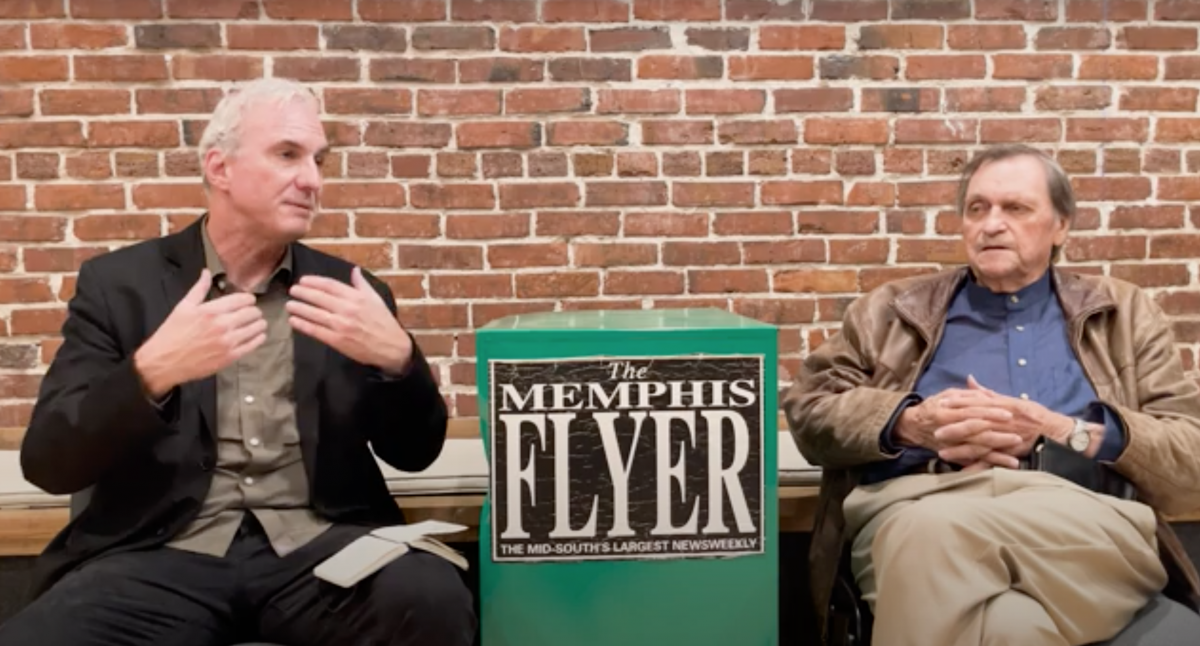

This week on the Memphis Flyer Podcast, political columnist Jackson Baker and Chris McCoy talk about the election and try to come to grips with what just happened. Check it out on YouTube.
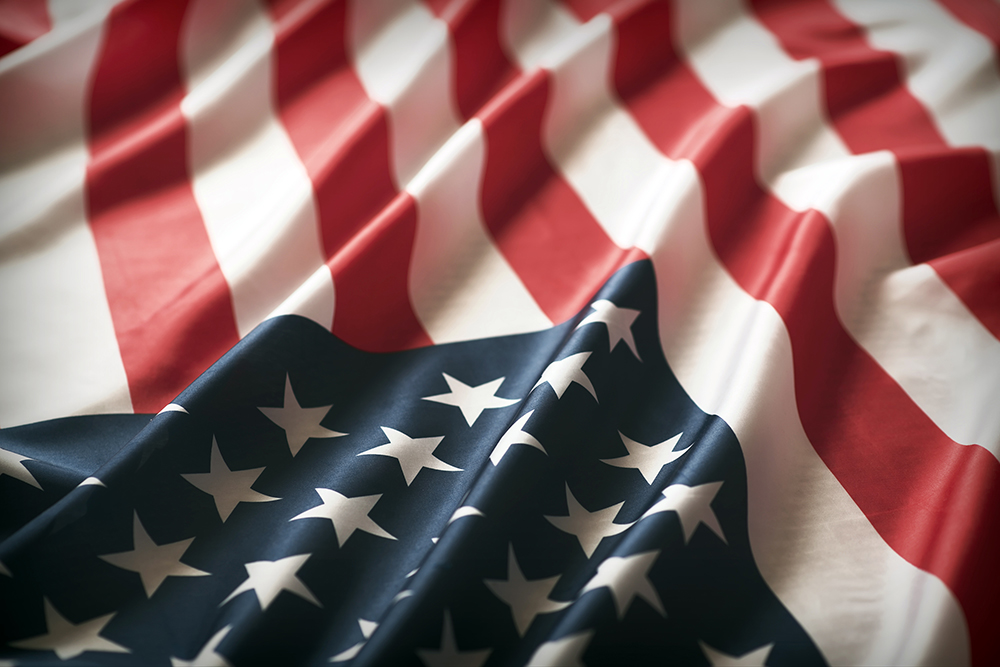
Editor’s note: Our political columnist Jackson Baker and former Flyer writer Chris Davis traveled to Milwaukee, Wisconsin, last week for the Republican National Convention on Monday, July 15th, to Thursday, July 18th. For this story, Baker and Davis reflect on their experiences, giving light to the ever-changing political landscape.
No sooner had we begun to digest the facts and fallout from the Republicans’ just-concluded convention in Milwaukee than the prolonged drama in Democratic ranks regarding the status of the ailing and beleaguered President Joe Biden abruptly resolved itself with Biden’s withdrawal from the election on Sunday.
However much that action had been anticipated, it still cast a shade on the events in Milwaukee, and attention, for better and for worse, will continue to gather and focus on the coming Democratic convention in Chicago in August. The immediate consensus among participants and observers alike was that there will be no open convention in Chicago — rather, a closing of ranks and a conferring of the nomination on Biden’s vice president, Kamala Harris.

It is even possible that the Democrats could nominate a second woman — someone like the much-respected governor of battle-state Michigan, Gretchen Whitmer — to fill out their ticket as Harris’ running mate.
Whatever the case, various expectations have been turned on their head, and the over-the-top machismo of the Republicans’ convention, culminating with the final-night showcase appearances of Hulk Hogan and Kid Rock, may look, in retrospect, like a misfire.
All the more reason to look back on the Milwaukee convention, which had been studiously stage-managed to present the aura of inevitable triumph.
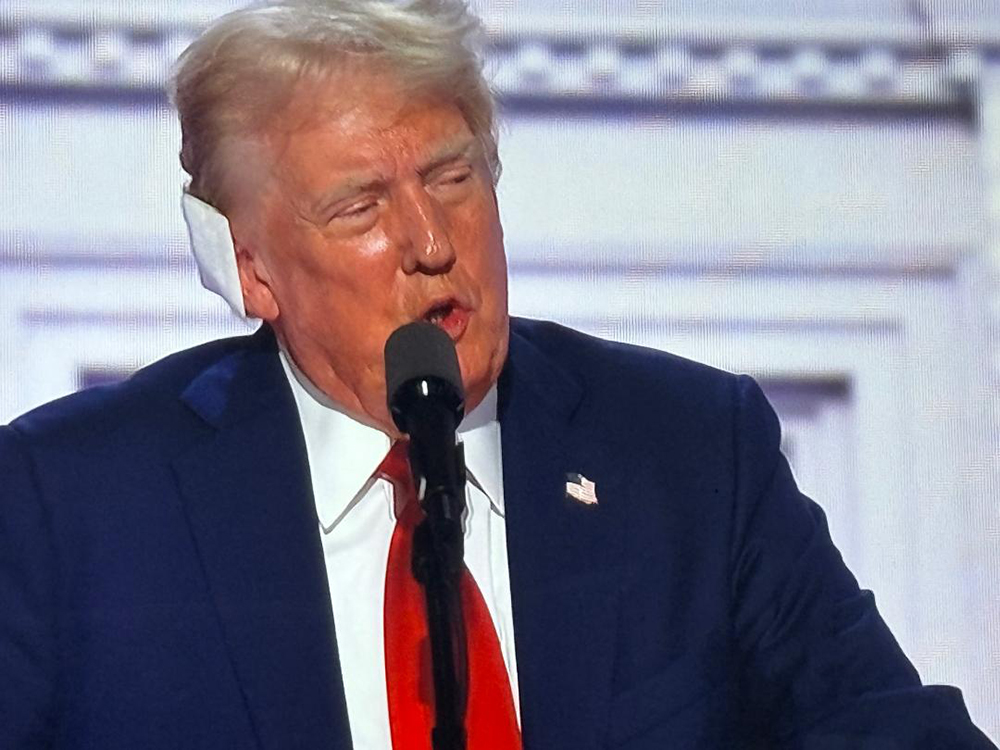
Against the memory of a doddering and fragile Joe Biden in the June 27th televised debate with former President Donald Trump, the Republicans could present the image of Trump as a hero-martyr, who, on the weekend before their convention, had risen after being felled by a would-be assassin’s bullet in Butler, Pennsylvania, to proclaim, “Fight! Fight! Fight!”
The donning of a conspicuously oversized bandage on Trump’s nicked right ear during the candidate’s public appearances in Milwaukee emphasized the degree to which the Republicans, understandably, expected to reap large symbolic dividends from the event.
On the opening night of their convention, last Tuesday, as on evenings to come, the Republicans, perhaps forgivably, would exploit Trump’s near-miraculous survival as a quasi-resurrection that reinforced what was already, here and there in his followers’ ranks, a near-messianic sense of the candidate.
And, though there was boilerplate aplenty served from the dais — regarding inflation, Biden’s presumed insufficiency, and other alleged shortcomings on the Democrats’ part — there were also overtures to voters presumed to be in the Democrats’ sphere of influence.
There was, for example, Teamsters president Sean O’Brien, who delivered a paean to the working class and denounced, in vivid detail, “greedy employers” and the evils of unbridled capitalism. It may have escaped most people’s attention that O’Brien did not explicitly endorse Trump; he merely expressed gratitude for being invited by Trump to address the convention. In a sense, he was more troll than Trumpian, but his participation in the GOP’s opening-night ritual was, ipso facto, an opening-out and an appeal to working-class voters.
The question rose uneasily to the minds of Democrats: Was it possible that a forthcoming realignment might occur as a benefit to Republicans, not themselves, the time-honored “party of the people”? And this concern could only have been deepened after remarks from the dais by one Amber Rose, a “model and TV celebrity,” as she was billed, and an ex-squeeze of Kanye West, no less, who professed herself a former “leftist” who could simultaneously praise Donald J. Trump and proclaim that Trump and his supporters “don’t care about Black or white or gay or straight. It’s all love.”
There were intermittent calls for national “unity” from the Republican stage, although, as these would be elaborated by Trump himself, notably in his later acceptance address on Thursday night, there were actually calls for the Democrats to surrender active resistance and to back away even from their forlorn hopes of salvation through acts of jurisprudence against Trump, most of those already all but scuttled by the Supreme Court.
Nor was there any mercy shown to President Joe Biden, who was subjected to patronizing remarks and Weekend at Bernie’s comparisons, alternating with chants of “Joe must go!” and claims that “He can’t even walk up steps and put on his own coat.”
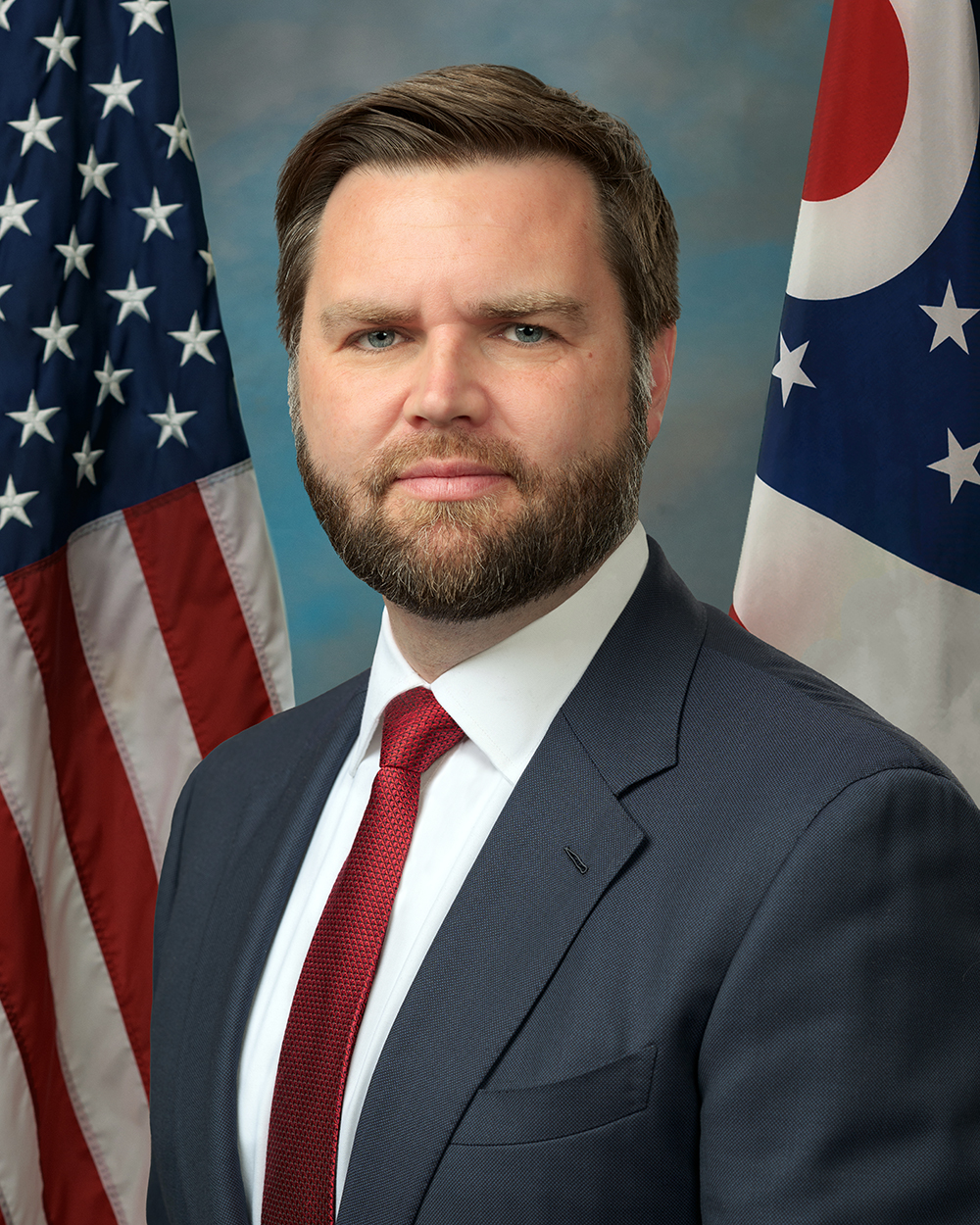
Not that there weren’t signs of disunity among the Republicans themselves. The new party line on foreign affairs — articulated by both Trump and his hand-picked vice-presidential candidate J.D. Vance — was to jettison the nation’s present commitment to shore up Ukrainian resistance against Vladimir Putin’s invading Russian armies. But some of the speechmaking — notably from an old warhorse, former Speaker of the House Newt Gingrich, and from Trump’s own erstwhile Secretary of State Mike Pompeo — was still insisting on regarding Putin as an arch-villain and the Ukrainians as victims.
Trump was credited simultaneously with being the only hope of restraining Putin and the architect of peaceful coexistence with him!
Such contradictions may now be highlighted as the Republicans refocus to train their fire on Joe Biden’s putative successor, Vice President Kamala Harris, who is something of an unknown quantity to them — as she is, indeed, to most Americans.
She may become the target of Republican reproaches owing to her lackluster early efforts as Biden’s vicar for border issues, but her prominence as a spokesperson for women’s reproductive freedom will more than offset that perceived weakness and reactivate the militant reaction against the Supreme Court’s Dobbs decision.
Milwaukee was chosen as the site of this year’s Republican convention for the same reason that Democrats had wanted to convene there in 2020 before Covid-19 had nullified their gathering then. The city, a de facto distant suburb of Chicago, is a haven for the struggling middle class and is a key to the votes of Wisconsin, a rust-belt state that both parties consider a must-win in November.
Like Memphis, it is a bit ahead of itself, a place for logistical anomalies — like the hotel which housed the Tennessee delegation, containing a splendid water park but no gift shop. Forget your toothpaste and you’re looking at an Uber ride to make up the difference. But meanwhile you can dream.
For the space of a week, Republicans indulged in a dream of political supremacy over a disabled opposition. We — and they — are about to see whether that was fantasy or reality, as the Democrats, under new management, prepare to meet in Chicago next month.
— Jackson Baker
……………
On day three of the RNC Chuck Fleischmann, Tennessee’s 3rd District representative, caught a tingle. “There is a certain sense of vibrancy in this convention that I haven’t seen since I was a young man in 1980 for Ronald Reagan,” he said to applause from the Tennessee delegation, who gathered for a breakfast meeting at The Ingleside Hotel and Water Park, a good half-hour bus ride from the main event at Downtown Milwaukee’s Fiserv Forum. That’s one way of describing the weird feeling in Milwaukee, where a general avoidance of Downtown by locals made the high-energy convention seem like it was happening in a ghost town patrolled by squads of imported bicycle cops with little to do but ride around in big loopy circles.
TV ratings were disappointing. The convention’s opening night was strong enough that pundits were talking about the possibilities of a new political realignment. In spite of featuring the party’s most diverse lineup ever, viewership was down 25 percent compared to a high-water mark in 2016. Even with 25 million people tuning in for Trump’s speech on the final night, the overall numbers fell just short of 2020’s Covid-impaired convention. Protests in Milwaukee were modest and almost nonexistent after the convention’s first day. A smattering of charismatic street preachers remained, leaping and shouting their fiery messages about God and Trump, while a few dedicated liberal activists walked lonely beats with their handmade signs resting on slumped shoulders. Overall, the energy was pretty low for this sort of event, but inside the Fiserv Forum, a hard-working five-piece cover band called Sixwire kept things humming along with hits by Steely Dan, Loverboy, The Rascals, and REO Speedwagon while delegates on the floor and guests throughout the forum danced and prayed and waved their cowboy hats from side to side for the cameras and all America to see.
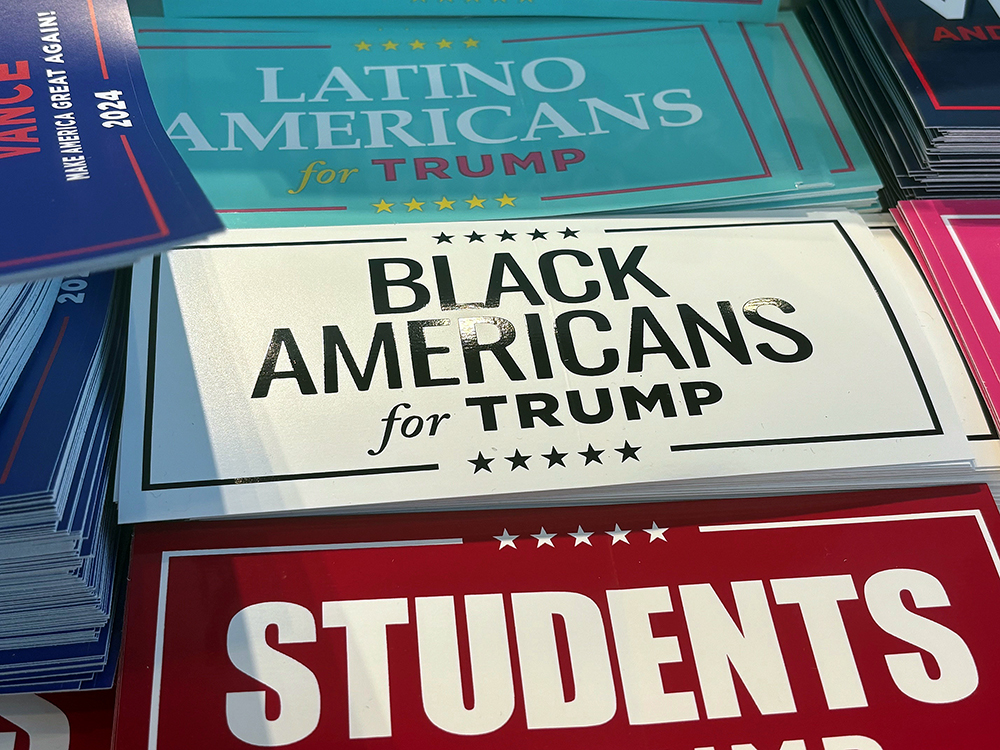
“We are the party of opportunity,” Fleischmann continued, back at the Ingleside, where there was no band and production values were less glamorous. “Race doesn’t matter. Gender doesn’t matter,” he said, naming two things that seemed to matter very much inside the Fiserv Forum, where delegates and guests can buy “Black Americans for Trump” stickers, and “Latino Americans for Trump” stickers, and “Women for Trump” stickers; and where, judging by reoccurring themes and enthusiastic crowd response, few things are worse than DEI, and nothing is more important than a willingness (the Republicans would say “ability”) to define what a man or woman is in the most simplistic terms.
Race has certainly mattered in Milwaukee, the swing-state city where the RNC chose to stage its big event. The city’s joint designations as the most segregated city in America and also one of the poorest, can both be linked to a legacy of redlining, and other race-based restrictions. But here I go missing the point.
It’s difficult to talk about what happened at the RNC, especially on the night of former President Donald Trump’s incredibly long and occasionally weird acceptance address, without falling into the fatal snare of fact checking. Trump, who boldly led the world into the post-truth era we currently occupy, made so many untrue statements he overwhelmed cable news resources who struggled to keep up an admirable exercise in futility. In a post-truth environment, facts will always matter less than feels, and right now the Right’s right to terrify immigrants with threats of mass deportation, and rattle the vulnerable, electorally insignificant trans community by insisting they don’t exist, makes our current GOP feel good enough about themselves to ignore that, even according to the very libertarian Cato Institute, Trump’s tax cuts skewed toward the rich and did none of the great things they were supposed to do.
No single idea presented onstage received more consistent applause than God, and outside of Trump, no single person received a bigger ovation than former Trump staffer and Project 2025 contributor, Peter Navarro, fresh from prison where he’d been cooling his heels following a contempt of Congress charge for refusing to provide documents and testimony relating to the January 6th insurrection. Tucker Carlson, the ex-darling of Fox News, might have gotten even more applause than Navarro had he not successfully petitioned the crowd to stop.
“God is among us,” Carlson concluded, following a gushing endorsement of the man he once claimed to hate “passionately.”
There are many layers to the RNC onion beyond what’s broadcast to the world. The friendly state delegation breakfast meetings are more intimate, and are often a place for more frank and practical conversations about what’s ahead. Mark Green, the embattled representative from Tennessee’s 7th District, wanted to make sure delegates understood what they were watching when the Supreme Court overturned the Chevron deference doctrine. He describes the decision as a victory over bureaucracy.
For 40 years, Chevron deference gave government agencies broad latitude to interpret ambiguous legal statutes and its dissolution puts a raft of public safeguards and environmental protections at risk. Green rejoiced in the decision to kill Chevron deference, and announced his plans to start rolling back regulations as quickly as possible
“The day of the hearing I dropped the ‘Save Us From the Chevron Deference Act’ [or the Sunset Chevron Act],” Green boasted. “It will repeal, in a rolling 30-day fashion, every single regulation passed under the Chevron doctrine.”
Inside the Fiserv Forum, wrestling icon Hulk Hogan ripped his shirt off and forcefully announced the arrival of “Trumpamania!” Back at the Ingleside Hotel, things were rarely so over the top, although 2nd District Representative Tim Burchett did say he believed America came one centimeter away “from full-blown Civil War,” when a lone gunman’s bullet grazed former President Trump’s ear in Pennsylvania. Inside the Fiserv Forum, Trump’s unfortunate and very nearly tragic brush with American gun violence is described as a holy miracle: proof of God’s divine purpose for the once and future leader of the free world. Back at the Ingleside Hotel, Chad Connelly, founder of the Faith Wins organization, showed the Tennessee delegation another way God works in politics.
“What if we go to churches in key precincts, get everybody to vote, and teach them to vote biblical values?” Connelly asked, recalling the questions he asked himself while figuring out how to “maximize” the Christian vote.
“I wasn’t going to push Republicans. I wasn’t going to push a candidate. I was going to push Christian values,” Connelly told Tennessee Republicans. By recruiting pastors to register voters and teach them to vote “biblical values,” Connelly says he helped to flip nine U.S. Senate seats in 2014.
“I believe a man named Jesus hung on a tree for me and for you,” Connelly said before announcing that he’s currently recruiting poll watchers to monitor elections in swing states like Nevada, Arizona, and Michigan. It’s not a hard job, he says. You only need to watch for voters over 100, and houses “occupied by more than six people.”
Representative Chuck Fleischmann was right about one thing: The 2024 RNC was a vibe. Almost mellow and with an eye for wholesale political realignment, it platformed unions, and women, and all kinds of Americans we’re not used to seeing at the RNC. With Christian Nationalism coming hard off professional wrestling’s top rope, it was also a camp masterpiece: a populist extravaganza with all the classic rock and J.D. Vance’s Mamaw’s 19 loaded handguns. Sure, the Nielsen ratings were low, but with President Biden exiting the race only weeks before the DNC, a “certain sense of vibrancy” may be all it takes to win the White House. — Chris Davis
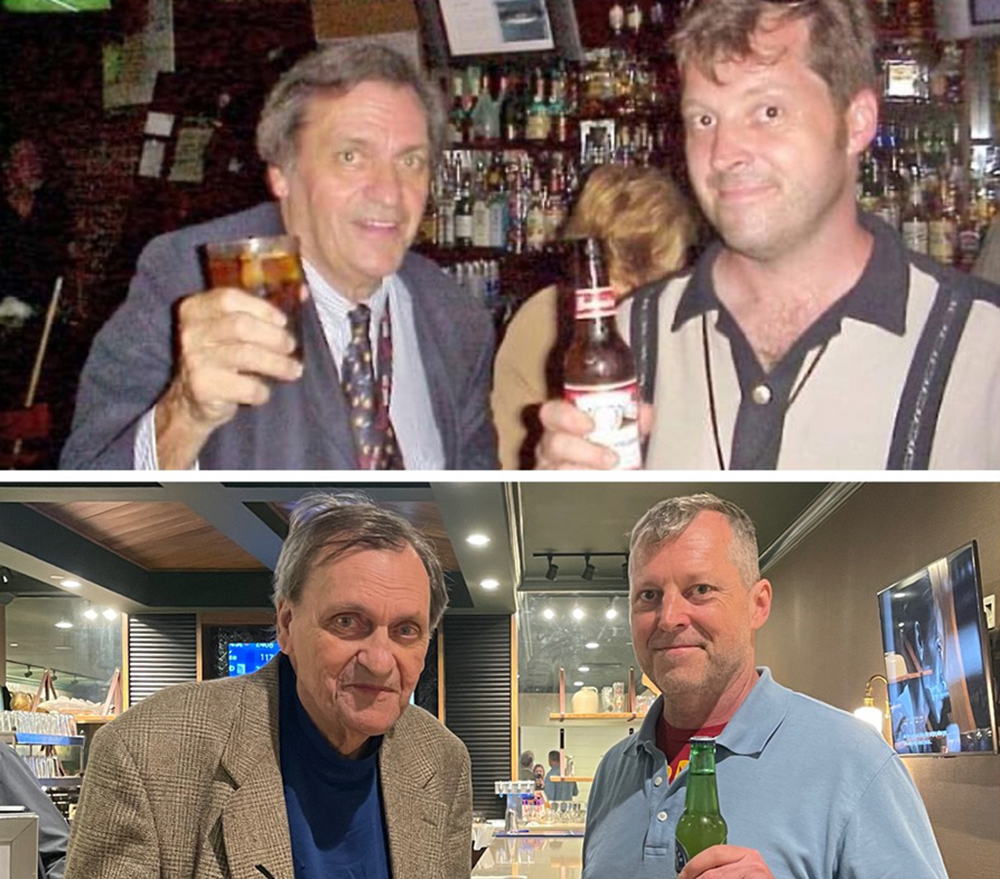
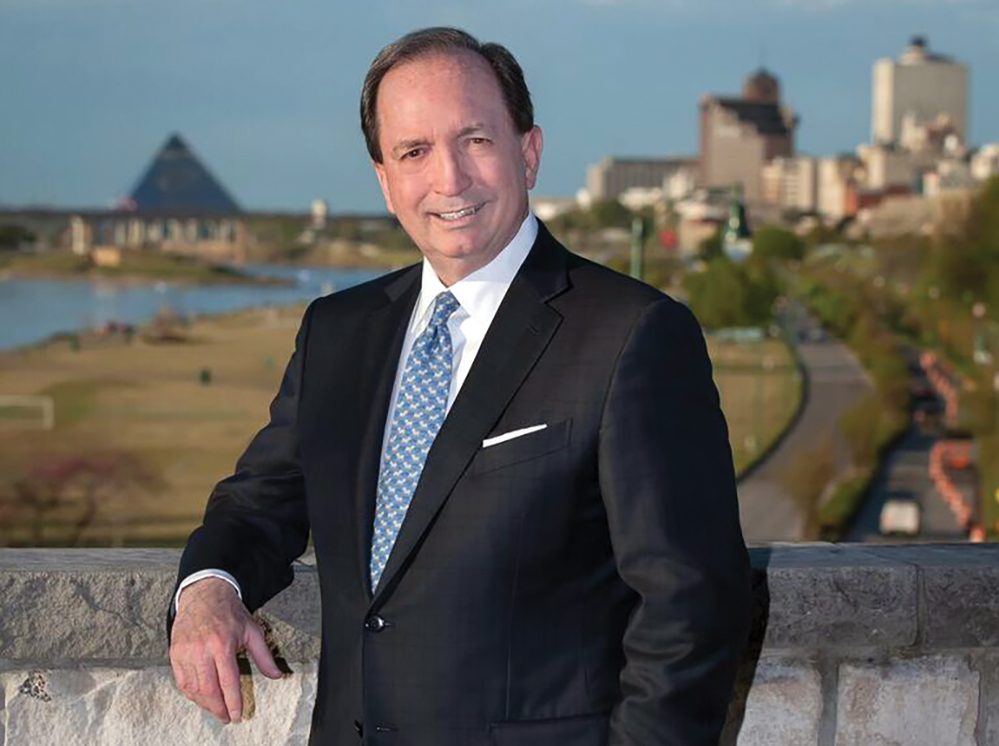
Some weeks ago in a year-end article in the Flyer we speculated on the unlikelihood of there being a white Republican candidate for Memphis mayor. At the time a few names in that category had been floated — those of former Sheriff and County Mayor Mark Luttrell and City Councilman Frank Colvett prominent among them.
As of this writing, there is little reason to believe that either one of those personages will become a candidate, but a new name has surfaced — that of John Bobango, who served a term on the Memphis City Council and is well-known as a lawyer of some eminence and as a donor and broker of numerous successful political campaigns on the part of others.
Bobango is known to have been making numerous phone calls of late, notifying friends and potential supporters of his potential availability to make a mayoral race. And, given his own past and current immersion in the political sphere, he has to be taken seriously as a possible entrant.
Should he become a candidate, Bobango’s name would not be as fresh with Memphis voters as either of the aforementioned names. His term of active political service ended in 2001; whereas, Luttrell’s term as county mayor was as recent as 2018, and Colvett is still serving on the council, having served a term as its chair.
What Bobango has in spades is financial resourcefulness, stemming from his own hugely successful career as a lawyer and investor, and from his presumed high potential to raise additional money from his extensive network of associates.
What he lacks, like all other potential white candidates, is membership in the city’s demographic majority. In theory, American politics is color-blind. In actuality, it is not, given the clear tendency of voters, in Memphis as elsewhere, to vote within the confines of their own ethnic connections.
The chances of any white mayoral candidate would be problematic. A white Republican like Bobango would face another disadvantage, that of belonging to a political party that clearly has minority status locally.
It is obviously meaningful that, in last year’s Shelby County election, Democrats prevailed so totally that not a single Republican was able to win a countywide race. And the Democratic base of Memphis is proportionally even larger — a fact that is relevant even in what will be a technically nonpartisan city election.
To be sure, a white candidate in this year’s mayoral race would be running against several African-American candidates and in theory would benefit from a voter-base split among them. The current incumbent mayor, Jim Strickland, undoubtedly benefited from such a split in his initial 2015 victory, and, to go with his identity as a Democrat, he had the kind of support from the city’s Republican voters that Bobango would hope to have.
But Strickland, at the time, was an active office-holder on the city council, and his mayoral ambitions had been known for years. Bobango’s active service in office was a generation ago.
But he was a factor in the city’s politics then, and, should he run, it would be instructive to see what he can make of the long-odds challenge that would confront him.
• Meanwhile, stop the presses! Another Republican, this one an African American, is apparently ready to join a mayoral field that is already rife with entries. This would be former County Commissioner James Harvey, who changed party affiliations some years back and has long meditated on a mayoral race, whether of the county or the city kind.
Harvey has sent out a notice under the letterhead “James Harvey – Mayor 2023” announcing a “Call to Action Campaign Meeting” scheduled for Friday evening of this week at the Southwind country club.
You do feel the needle going in. Don’t let anybody tell you otherwise. And, depending on the day’s weather, it’s likely to be cold and drafty when you have to bare an upper arm to get your COVID vaccination shot.
Have an “appointment” to get a COVID vaccine, do you? Well, good luck. Things may have become more streamlined since early last week, when negative word-of-mouth and social media had famously attested to the delays and traffic snarls of the county’s vaccine rollout. You could count on spending hours of your life in bumper-to-bumper traffic, driving in seemingly endless loops across the whole of the Fairgrounds driving surface to reach one of the six improvised bays in the interior space in the Pipkin building. There, finally, assisted by some very helpful and, under the circumstances, preternaturally cheerful folks administering the shots on behalf of the Shelby County Health Department, you could begin your inoculation against the potentially deadly and certainly ominous virus and conclude Phase One of the requisite two.
 Scaliger | Dreamstime.com
Scaliger | Dreamstime.com
An ordeal? Yes. And worth it? Yes, and hail to the hard-working folks who were there laboring in the building’s six bays long before you get there and who will be there long after you leave. Like the besmocked lady wielding the needle when I pulled up: “Got to have some flesh,” she said, prompting me to temporarily shed coat, sweater, and shirt, and the assisting Sheriff’s Department deputy who had greeted me by saying, “Where you been? Been waiting on you for six hours!”
And that was no joke. It had been every minute of six hours since I had pulled my Kia Soul into the north entrance of the Fairgrounds, off Central Avenue onto Early Maxwell Drive. “Where’s the Pipkin Building?” I had naively asked the deputy who was parked there, his car’s revolving light flashing, to monitor new arrivals. “Get behind the red car,” he said, indicating a late-model Volvo. Upon complying, I noticed that I was thereby joining a queue of seemingly stalled vehicles that, via that previously indicated series of back-and-forth loops, spread far into the distance. Farther, indeed, than I could see. Hundreds of them, I would ultimately realize. The line would presently begin inching forward, and I mean “inching.” You know that old maxim about watching paint dry? Well, the queue’s progress was of that kind.
It was only later that I reflected on the obvious circumstance that all of these folks could surely not have been scheduled for 4 p.m., as I was, or 4:30, as my son Marcus, who was with me, was. Nor even 5 nor 5:30 nor 6, for that matter. A significant percentage of them had to be crashing (as in “gate crashing,” though, given the immensity of the jam-up, the literal form of the verb was always a possibility).
Note: I am trying not to be overly querulous here, nor judgmental. We all know that, going into January, neither the state nor federal sources had been models of advance preparation. Nobody knew exactly how much vaccine was on hand locally nor how long it would last. The first shots had been administered, without prior notice, in several days in late December and the first week of the New Year. They were earmarked for first responders and medical folk, but the grapevine had alerted a sizeable number of interlopers, and, in practice, those word-of-mouthers who were 75 or older had been permitted in the drive-throughs at Lindenwood Christian Church and the Health Department’s facilities on Sycamore View. For a week or so, the vaccination process was on hold, then opened up again on January 12th via a registration process.
Before the rolls closed on the month of January, I was able to grab a spot on grounds of age, and Marcus by dint of certifiable disabilities. Believe me, when the day came, it was beneficial to have a companion and an active radio, tuned mostly to SiriusXM news stations, from which I would learn, repetitiously and in detail that day, about both Representative Marjorie Taylor Greene and the Robin Hood caper on Wall Street. There wasn’t much we could do about the paucity of porta-potties — only three over the whole Fairgrounds expanse. And we hadn’t thought to pack water bottles or snacks.
I am no masochist, but, lookit, all of the hardship, culminating in that final bite of the needle, turned the whole day into something of an adventure. And, yes, I’ll be grateful for the chance to do it one more time.
Jackson Baker is a Flyer senior editor and politics editor.
In March 1995, I had multiple media obligations, one of which was that of regional correspondent for Time magazine. The magazine was generous to its scrubs, never more so than when it asked me to accompany Tennessee’s own Lamar Alexander on his announcement tour for a run for the presidency in 1996.
The tour began in Alexander’s hometown of Maryville, and it ended in Florida after a week’s travel to stops in Iowa, New Hampshire, Texas, and several other states where the then-ex-governor would be on the GOP primary ballot the next year.
The nature of such tours is that the candidate, accompanied by his campaign entourage and a press pack, flies to pre-planned venues and makes the same speech over and over.
Alexander’s themes were typically Republican ones of the time (holding down taxes and deficits) and were couched in generalities. At one point along the route, as I reported to Time, he got a phone call of encouragement from Ross Perot, the third option from the presidential race of 1992. (Asked about that on C-Span later that week, Perot clammed up, other than to grouse about “some reporter evidently sitting too close on the plane.” Actually, it had been an ad hoc chartered bus. In any case, I basked.)
Two points continually repeated by the candidate stood out — his lamentation that school kids no longer felt free to take a pocketknife to school (an obvious metaphor whose import escaped me) and his insistence on abolishing the Department of Education (an odd position, I thought, for a recent former U.S. Education Secretary and UT president).
I was most impressed (and grateful) at a meet-and-greet at the Sioux City airport when, in sub-freezing temperature, Alexander’s speech, in its entirety, went: “I know you all want your next president to be a man of good judgment. My judgment tells me we’ve got to get in out of this weather.” Much more than the pocketknife thing, that made for a human connection.
It seemed natural then — as it has ever since — to think of this personable man as Lamar, especially since his given name, plus an exclamation mark, was in fact his campaign slogan, festooned on bumper stickers, wall signs, and everything else.
He came close to making it all the way in the Republican primary, being edged out in the last week of the New Hampshire primary by Bob Dole, who paid for a blizzard of last-minute TV commercials attacking Alexander, improbably, as a mad taxer.
I always thought of Alexander as an executive personality and later, when he mounted a political comeback as a senatorial candidate, wondered how good a fit the legislative role would be for him. Even now, with the three-term senator retiring, I still wonder, since so much of that job consists of toeing, or having to confront, a party line laid down by somebody else. The senator’s problems of that sort became acute under the yoke of Donald Trump, and never more so than when Trump was defeated for re-election and seemed determined to ignore that reality and to fight to remain in office.
Lamar’s first few responses to that were hamstrung to the point of setting the bar for forthrightness at ground level. Example: “If there is any chance whatsoever that Joe Biden will be the next president, and it looks like he has a very good chance, the Trump Administration should provide the Biden team with all transition materials, resources, and meetings necessary to ensure a smooth transition so that both sides are ready on day one.”
If? Both sides? This was two weeks after the election, when there was no mystery whatsoever as to who had won.
More Lamar: “Al Gore finally conceded 37 days after the 2000 election, and then made the best speech of his life accepting the result.”
That’s a false equivalence if there ever was one. There were some 537 votes at issue between Gore and George W. Bush, in one state, Florida — unlike the many tens of thousands of votes dividing Biden from Trump in multiple swing states!
This week, Lamar got closer: “Since it seems apparent that Joe Biden will be the president-elect, my hope is that President Trump will take pride in his considerable accomplishments, put the country first, and have a prompt and orderly transition to help the new administration succeed.”
Leaving aside those “considerable accomplishments,” that was pretty much on target. Congratulations, Senator Alexander, and thanks.. As you concluded, “When you are in public life, people remember the last thing you do.”
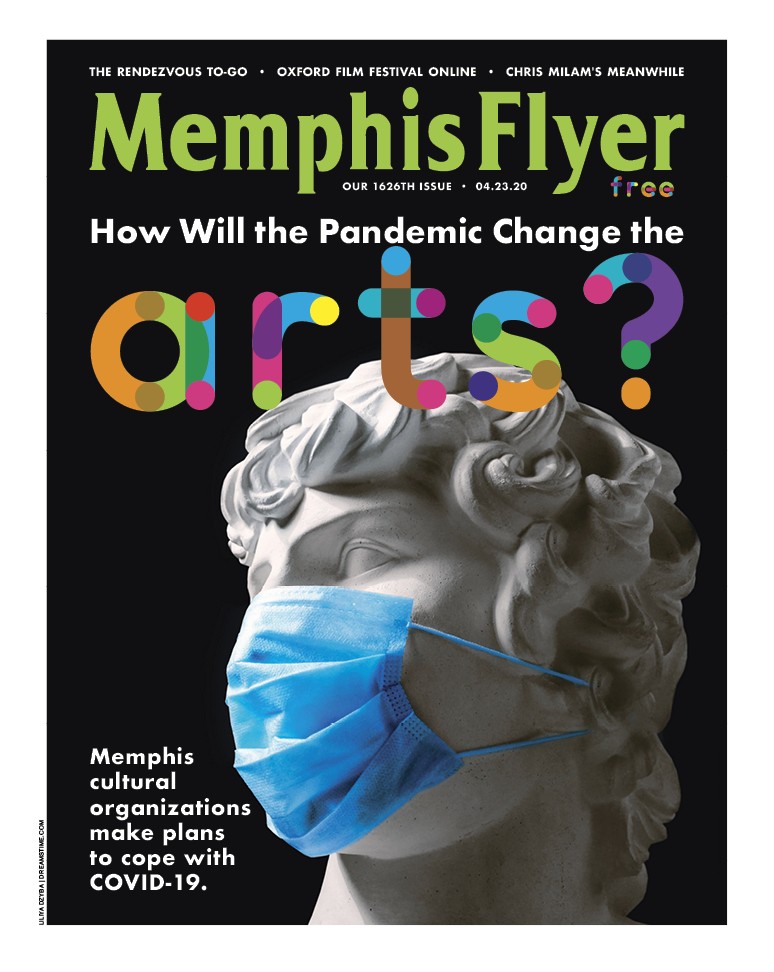
Here’s the story lineup for this week’s virtual issue. Enjoy! We’ll be back in print next week, April 29th. — BV
Letter From the Editor: Blue Skies From Now On — Bruce VanWyngarden
MEMernet: A Very Memphis Easter, a New Bar — Toby Sells
The Week That Was: Data, Abortion, and Domestic Violence — Maya Smith
The Fly-by: Displaced Actor Finds Work, Purpose Serving the Underserved — Toby Sells
Politics: Commission Gets $1.4 Billion Budget From Harris — Jackson Baker
Cover Story: Memphis Cultural Organizations Learning to Deal with the Pandemic — Jon Sparks & Chris McCoy
Steppin’ Out (Stayin’ In): Silky O’Sullivan’s Hosts Virtual Happy Hour — Julia Baker
Books: Corinne Manning’s We Had No Rules — Jesse Davis
Music: Chris Milam’s Meanwhile is a “Good Album for Quarantine” — Alex Greene
Food & Wine: The Rendezvous Adapts During Quarantine — Michael Donahue
Film: Oxford Film Fest Debuts Pioneering Online Format — Chris McCoy
Last Word: Coronavirus is a Dress Rehearsal for Global Warming — Alex Greene
This is the best column anyone ever wrote in the history of Memphis.
Many people have thought about writing a column this good but were unable to get it done. People are saying no one can write a column like I can, and they are right. It’s not surprising. That’s because I invented the word “column.” I have all the best words, and no one else even compares.
Geoff Calkins tried 11 times to write this column. Dan Conaway couldn’t even make his fingers move when he tried to write this column. Tonyaa Weathersbee? No way. John Beifuss? Don’t make me laugh. Even Jackson Baker gave it a shot, but it just didn’t happen.
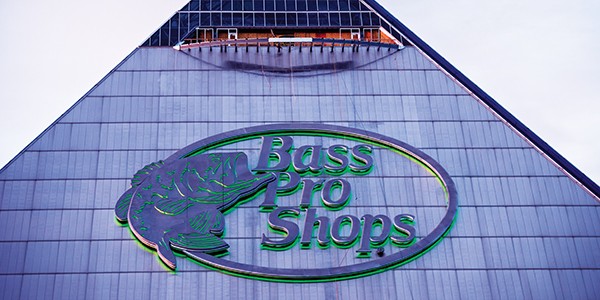
I’m a stable genius, and I’m the best. Get over it. No one writes like I can. But writing isn’t all I do.
Many of you have probably driven by the empty pedestals in Memphis’ Downtown parks. Most people don’t know there used to be statues of Confederates there. They were very fine people, but the statues were put up after the War Between the States, which I call the “Civil War.” Many people don’t know that we had a Civil War. That’s because it was 300 years ago, which is why we needed to take down the statues. They were too old.
I called the mayor of Memphis last year and said, “Mayor Stricker, those statues have to come down.” He said, “Sir, no one has been able to take down those statues. They’ve been there for 250 years. It can’t be done, sir.” Well, I got it done. Afterwards, he said, “Sir, I did not think anyone could do that. Thank you.” There were strong men and women in the mayor’s office, and they were all crying because they didn’t think anyone could take down those statues. They all said, “What a great outcome, sir. Thank you. And congratulations.”
True story. You can look it up.
Many of you will be surprised to learn that the University of Memphis football team used to be terrible. It’s true. They lost 29 games in a row in 2003. It was ridiculous how bad they were. Most people don’t know that David Rudge, the president of the university, called me a couple of years ago. He was whimpering and crying on the phone. He said, “Sir, what can we do? People are saying our football team is terrible.”
I said, “Hire a great coach, Dave.” And I told him about this young fellow, Mark Norveen, who at the time was an assistant volleyball coach at Arkansas College. Most people haven’t heard of Arkansas College. Great school, just outside of Tulsa. Mark’s a handsome young man. Right out of central casting. “Hire Mark Norveen,” I said.
Well, Dave did, and look what happened. The Tigers have been undefeated for six years, and they’re going to be on Fox’s “Gamers Day” show with Steve Doocy this weekend against the great University of Notre Dame.
I plan to be at the game. They’re going to put my picture on the big television screen — I call it a JumboTron — so people can cheer for me. People are saying I’ll get the greatest ovation in the history of football. They say 20,000 people won’t even be able to get into the stadium.
There are lots of other things that many people don’t know about me. For example, I helped do the deal to get Bass Pro to build a pyramid Downtown. It used to be a Walgreens. The elevator to the top? That was my idea. The giant man-eating alligators? That was my idea, too.
And many people would be surprised to learn that I was behind getting $270 million dollars allocated from the city to move the Raymond James brokerage out of that dump Downtown into a great new building they already owned out in eastern Memphis.
Here are some other things people would be surprised to learn about me:
I helped design the Midtown Kroger parking lot.
I taught Penny Hardaway how to do a crossover dribble.
I named Mud Island.
I invented barbecued ribs.
Do I get any credit? No. But that’s all right. I’m a big boy. I don’t need the applause. I don’t need everybody to grovel and suck up to me. Many, many people are saying I’m the best columnist ever and this is the greatest column anyone ever wrote. That’s enough for me. For now.
After I spread The Commercial Appeal on my kitchen table Tuesday morning, the first thing I read was reporter Daniel Connolly’s story on Criminal Court Judge Jim Lammey, who, it appears, is quite the racist. Lammey posted articles on Facebook that called Muslims “foreign mud,” criticized the school “integration craze,” and said, Jews should “get the f—k over the Holocaust.”
Connolly reported that Lammey shared numerous articles and memes of this sort on his Facebook page. Lammey said he accidentally switched his posts to public. Oops. Just the kind of guy you want making decisions about immigrants, right? Which, among other things, is exactly what Lammey does. He did say his best friend was Jewish, so there’s that. Go read the story. It’s nauseating.
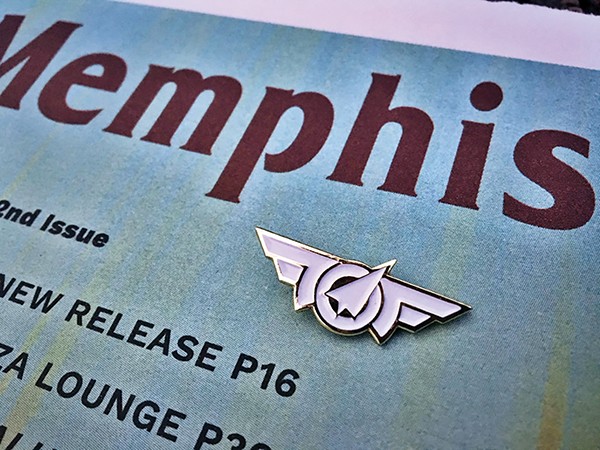
This is the part where I tell you that if it weren’t for a local journalist doing some solid reporting, I wouldn’t have known any of this. And if you didn’t read the CA, you wouldn’t have known about it either, until you read this column. The larger point being, stories like this one are why local journalism matters, now more than ever. Without journalists, those who hold public office can get away with just about anything — with your taxpayer dollars picking up the tab.
For another example, read Jackson Baker’s column this week on how fallout from the state’s absurd school-voucher bill could impact Shelby County’s 2020 budget. Where else can you find reporting from someone who spends a couple of days a week in Nashville covering the legislative clown show, then returns to Memphis to cover the county commission? Nowhere but the Memphis Flyer.
There’s also fine local reporting coming from The Daily Memphian website, and at several local nonprofit reporting organizations. They’re all important. They’re all vital to a well-informed citizenry. Give them your support and your money (cough, support.memphisflyer.com). It’s a small amount compared to what a couple of crooked officials can cost you, or a boondoggle geared to a politically connected developer, or, well, you name it. There are any number of ways those in power can quietly utilize public funds for mischief.
It’s the press’ job to keep that mischief in check by bringing it into the light, which is why a report from the Governing.com website this week is so troubling. As the report states: “One in five Americans now lacks regular access to local media coverage. Studies show this is bad for politics, municipal debt — and even the environment.”
In 2018, more than 2,000 journalists lost their jobs, a trend that has been ongoing for more than a decade: “… newspaper closures and declining coverage of state and local government in general have led to more partisan polarization, fewer candidates running for office, higher municipal borrowing costs, and increased pollution.”
That’s a hell of a laundry list. More from the report: “Since 2004, some 1,800 newspapers have closed entirely. … In many other places, newspapers are ‘ghosts’ of their former selves. … Nearly half the counties in the U.S. have only one newspaper.”
And as local media coverage dies, the void gets filled by national news and opinion, most of it spread through social media; that’s all those links to politically charged stories that appear on your friends’ Facebook pages. And that means we are becoming less informed about local issues — the ones that affect us the most — and less engaged with local government. The corollary is that we’re more engaged with national issues, which has led to more political polarization — why you now get in internet fights with that guy you used to like in high school.
Making matters worse is the fact that more and more people (including nine out of 10 Republicans!) don’t trust the media. The mantra of “Fake News!” is taking its toll. And we’re all the worse for it.
But no matter how often a certain president says it, the press is not “the enemy of the people.” Quite the contrary. America’s Founding Fathers made freedom of the press a part of the First Amendment, and there’s a reason it was the first. An uneducated and uninformed public is more vulnerable to demagoguery and more easily manipulated. So, please support your local press. It’s more important now than our forefathers could ever have imagined.
The week that was …
I don’t know about you, but I find that I notice the passing of time mostly by my mundane weekly rituals. As in, hey, it’s Tuesday: Gotta write a column. Wednesday: Time to prep for the morning staff meeting. Thursday: Go on the radio with Drake. Saturday: Buy pet food, hit the grocery store. Sunday: Ooh, Ray Donovan is on. Aaannd, it’s Tuesday again.
My life is much richer than those weekly markers might indicate, but the repetitive events are what remind me that time goes by in a flash, that weeks pile up into years pretty quickly.

On Monday, I drove over to the central library to appear on Willie Bearden’s Dialogue show for the library channel. It’s a simple format: You sit for an hour and get interviewed about your life and career and whatever else comes up. It was an interesting exercise, and it evoked some stories, memories, and experiences I hadn’t thought about for a while.
Willie’s final question was, “How do you want to be remembered?” To which my first thought was: That’s not a question you ask a young person. Yikes. Like the commercials say: Life comes at you fast.
Likewise, I imagine the weeks are going by pretty quickly for the Memphis City Council — now down to 10 members — who are going to have to figure out how to compromise at some point to get a full quorum and get the city’s business done. The drama will no doubt resume this week. In a guest column in The Commercial Appeal, Councilman Worth Morgan called the situation, “an embarrassingly intractable instance of failed governance,” which is on the money, if a bit wordy. So fix it, y’all.
Other events of note this week: LeBron James and the Lakers came to town and stomped the home team. The Gannett Company is again making noises about staff cuts at its newspapers (which isn’t even news, anymore). Jackson Baker and Michael Donahue sang karaoke together at the Flyer holiday party. And iconic local chef and all-around good guy, Gary Williams, died unexpectedly. R.I.P.
Nationally, the silly debate about “Baby, It’s Cold Outside” continued to rage. The song came on the speakers when I was in Fresh Market on Saturday. Customers began throwing arugula on the floor in protest and a small fire was ignited in the deli section. As customers stomped out in protest, the staff was attempting to put out the blaze with bottles of San Pellegrino. Sad!
None of that is true. Nobody listens to background music about sexual harassment. Or consensual flirting. Or whatever the hell you choose to think that song is about.
One guy who had a very bad week was President Trump, who has gone from denying he even knew Porny, er, Stormy Daniels, to admitting he paid her (and another former paramour) to keep quiet about their illicit affair(s). According to Trump, it was all okay because it was paid with personal funds and was a “private matter.” Good luck with that argument, Mr. Trump. Or should I say, “Individual 1.” Trump’s ALL CAPS tweeting percentage has been on the rise, as more and more of his former associates become besties with Robert Mueller.
I continue to read that a sitting president can’t be indicted. I don’t know how legit that legal opinion is or whether it will be tested at some point. But there’s a real problem with that thinking: If a president can’t be indicted, then what’s to prevent any future candidate from breaking all kinds of laws to get himself elected, knowing that once he’s in office, he’s immune from prosecution? That would seem to encourage and reward law-breaking.
And does that mean the president really can shoot someone in the middle of Fifth Avenue? That can’t be what the Founding Fathers had in mind. But then again, the Founding Fathers probably never anticipated a Congressional majority that would be complicit in such a matter.
In other news, my New Year’s resolution is to quit smocking, and I am going to insist that Flyer staffers now call me “Individual 1.”
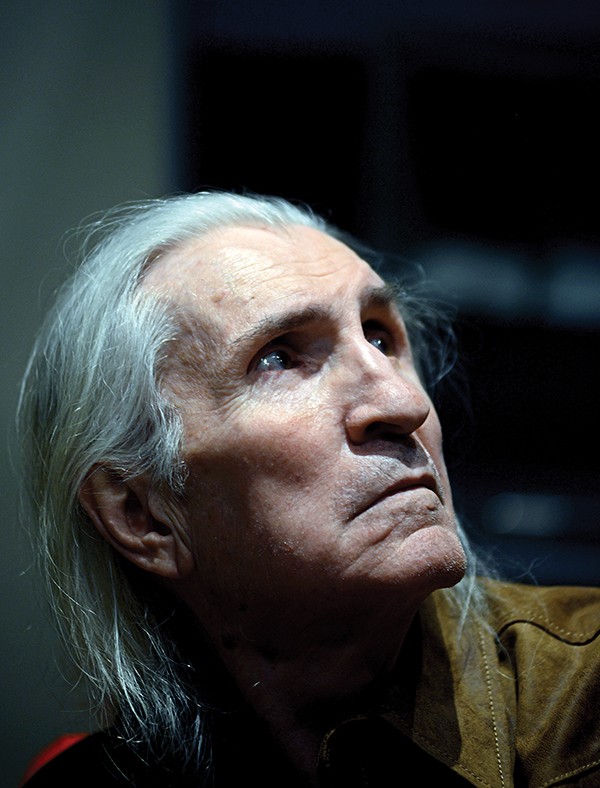
December 2024 note: In light of Stanley Booth’s death this past week, we thought Flyer readers might enjoy Jackson Baker’s profile from a few years back.
“I think it’s only fair that all those people are dead, and we’re not.”
This was said on a recent evening by Stanley Booth, aged 76, and my friend for well more than half a century. Yes, we have outlived our share of contemporaries, but I am not quite sure how to take the remark, especially since Stanley promptly begins listing exceptions to this category of the justly deceased.
Among them are such other longtime Booth friends as Irvin Salky and Charles Elmore (the latter known as “Charlie Brown” for his roundheaded resemblance to the Peanuts comic strip character), both gentle souls, both legendary facilitators in these parts of general folk-art awareness, and both, as it happens, in on the creation of the early Memphis blues festivals. Salky died from complications of a stroke in 2016; Elmore more recently from the ravages of a beating and maiming by street toughs.
Another death to be lamented was that of Jim Dickinson, the one-man music renaissance whose legacy lives on in his two sons, Luther and Cody, both players in the North Mississippi Allstars; in the Dickinson-founded group Mud Boy and the Neutrons; and in other hell-raisers both local and in the musical mainstream at large. It has been all of nine years since Dickinson’s passing, and Booth, then living in his native state of Georgia, recalls his surprise and dismay in learning of it:
“I didn’t know Dickinson was that ill. You just don’t expect your friends to die like that.” Booth remembers having a long-distance phone conversation with Dickinson three days before his death, one that Dickinson closed out by saying, “Look, we could talk like this for hours, and we will.”
Booth is the author of celebrated literary works like The True Adventures of the Rolling Stones, a lengthy, sui generis chronicle of the great rock-and-roll group; and of Keith, an in-depth portrait of Stones guitarist Keith Richards; and the purposely misspelled Rythm Oil, a collection of profiles and other pieces about the music of Memphis and the rest of the American South.
Booth is now readying for publication another collection of 26 pieces, to be entitled Red Hot and Blue, which might be recognized as the name of the late-night radio show presided over in the ’50s by the late redneck DJ Dewey Phillips, who first broadcast music by Elvis Presley and who, as much as anybody else, deserves credit for bringing rhythm and blues into the musical mainstream.

Booth’s recollection of Phillips, the culminating piece in the new collection, will doubtless go far toward reminding the world of Daddy-O Dewey’s contributions, and the new book as a whole may do the same for Booth himself.
To talk with Stanley Booth is, at times, to encounter an unusual sense of fatalism. Or perhaps, rather, a heightened sense of the vulnerability and impermanence of the human flame. He mused recently that he befriended Phillips in the year or so before the death of the iconic DJ — then hanging on to life and credibility at a small radio station in Millington — and that, similarly, he had met Stones co-founder Brian Jones before Jones’ death by drowning in a swimming pool, and that he had been in a room at Stax-Volt studio with Otis Redding when the great Memphis soul artist was composing “Dock of the Bay,” the classic ballad he recorded just before his touring plane went down in 1967. Booth sums it up by saying wryly, “Meet Stanley and die.”
As recently as August 2012, Booth received a Lifetime Achievement Award from the Smithsonian Institute, but that and a slew of like honors did not prevent him from tottering on the edge of an existential abyss.
In August of 2012, his third marriage, to the poet Diann Blakely, was in tatters, and her death proved unsettling in numerous ways, including geographical. Booth ended up decamping that October from the couple’s Georgia residence and returning to Memphis, where he had moved with his parents in 1959, studied at Memphis State University (now the University of Memphis), and lived for many years, finding our blues-soaked Delta capital to be the source of many of his early subjects and inspirations.
Memphis was also the scene of numerous frustrations for Booth over the years and would continue to be even after his return. He rented a house on Belvedere and, in short order, became destitute. He befriended a homeless man, who had taken up residence in an outdoor shed. As the weather worsened one winter, Booth invited the man to come in out of the cold and spend time in the house.
The man did, and, as Stanley tells it, “he went on to steal my car and a bunch of other stuff.”
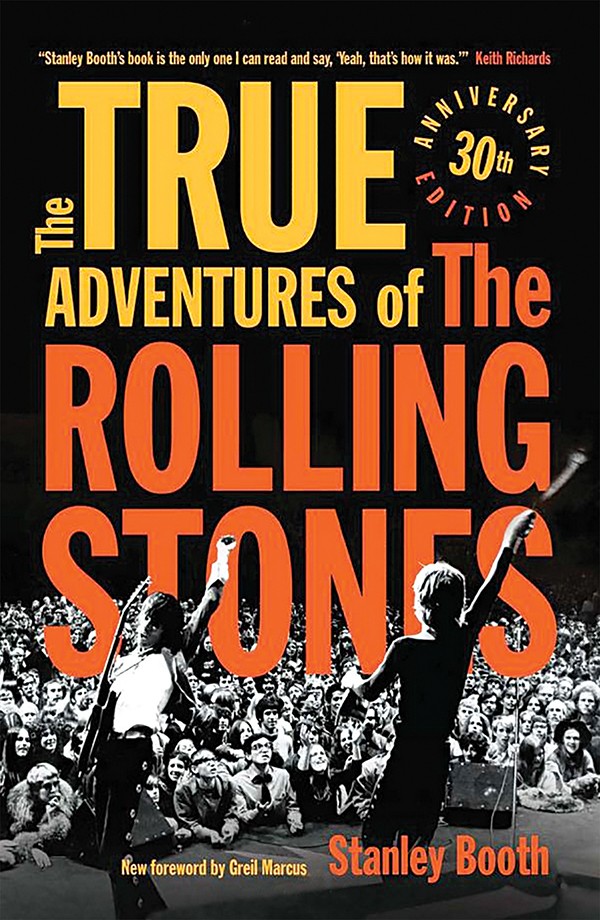
Over the last few years, his lifetime achievements seemed to have come to nought. He recalled: “You can’t eat reputation. If I had a nickel for every good review I’ve had …” he said, letting that sentence fade out rhetorically. He had lived for several years in the Arkansas Ozarks, where he had holed up in a cabin with the aforesaid Charlie Brown and written much of his Stones book, and that experience suggested a strategy.
“I was thinking of getting out, packing a bag, and going to the Ozarks, to a cave. I had worried about becoming homeless when I was on Belvedere. I was out of money, thinking seriously of going to Arkansas and living in a cave. I know where several caves are that maintain a temperature of 65 degrees inside, year-round.”
Instead, Booth ended up using the life insurance money left him by Blakely to buy his current house, a modest brick bungalow in the vintage Vollintine neighborhood, among largely African-American neighbors. He remained carless, as indeed he is today, dependent for transportation on others.
Here is the appropriate spot for a little backstory. Stanley and I, both English majors at Memphis State in the ’60s, with similar tastes and vague aspirations to be famous writers, had gotten to be fairly close friends, it’s fair to say — though there was always an element of rivalry, both as fledgling wordsmiths and in other ways common to greedy and needy undergraduates of our sort. Let me confess: He was much more the classic stud, though he surprised me recently by expressing envy, ex post facto, about a time or two I’d gotten lucky.
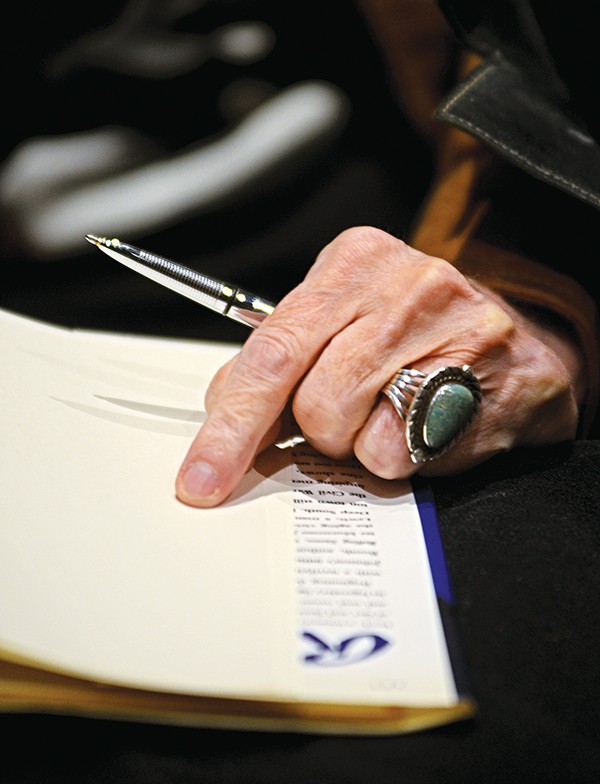
After graduation, we stayed friendly. When I had an optional operation to remove a benign bone tumor, discovered during a brief stint in the Air National Guard, my first post-operative visitor outside my immediate family was Stanley Booth, who brought me flowers(!) and stayed for a while, meanwhile charming my mother and grandmother.
We had both thought of fiction as the likely arena of our development — he a Hemingway acolyte, me fixated on Fitzgerald — but I would get a series of post-graduate jobs as a journalist (with, sequentially, the Millington Star, the Blytheville (Ark.) Courier News, and the Arkansas Gazette), and Stanley, too, in those years of the New Journalism, moved into the province of non-fiction, setting out with deliberation to master the art by tackling the subject of the street sweeper and indigenous Memphis blues artist, Furry Lewis, to whom he was introduced by Brown.
Stanley tried unsuccessfully to sell that article to Esquire, the magazine which then was the epitome of hip to young writers, and was told instead that the magazine was looking for someone to write about Elvis Presley. The Furry Lewis piece, shelved, would later be published by Playboy, which would give it that magazine’s award for non-fiction article of the year. Meanwhile, Booth cast about for some way of getting close to Presley, then still in the premature mummification of B-movie Hollywood.
That’s when Stanley connected with Dewey Phillips, looking for an entree to the reclusive Elvis that the disc jockey could no longer provide. And one night — this was the summer of 1967 — Stanley and I dropped some acid and killed an evening at the East Memphis apartment complex where he was then living. As he knew, my family had, for a period of months, when the young Elvis had begun to score as a Sun Records artist, lived next door to the entertainer and his parents, who were then inhabiting a modest house on Lamar Avenue.
Years later, my brother Don and I had ended up at Graceland for an evening, in the company of a veritable mob of hangers-on, and on this evening in 1967, years later, I told Stanley about that and much else that I remembered about Elvis. I related in some detail a story from that surreal night at Graceland, focused around my brother’s nervously playing Elvis’ piano in the wee hours, under the gaze of a just-awakened Elvis, followed by the whole crowd’s going outside to watch the icon’s largely futile attempts to fly a model airplane.
That story, rendered with artful third-person objectivity, along with my recollections of a key Presley concert at old Russwood Park, would end up as the borrowed centerpieces of an Esquire article that would put Booth on his way. The article, entitled “Hound Dog, to the Manor Born,” was masterful, insightful, and wholly deserving of the classic status it achieved almost immediately and maintains today. Its writing owed much to the example of Gay Talese, an avatar of the New Journalism who had demonstrated in a previous Esquire article entitled “Frank Sinatra Has a Cold,” how one could write a profile without access to its subject, by dint of patient and probing interviews with other people who had enjoyed such access.
Out of necessity, the story lacks a characteristic ingredient of virtually everything else Stanley has written, a focus on his own experience as a major leitmotif in whatever he has to say about his avowed subject. Open any page of The True Adventures of the Rolling Stones at random, for example, and you are as like to find an account of Stanley’s entertaining a passage with a lady friend as you are one of his brilliant evocations of the Stones in concert or on the prowl.
With the exception of that first Esquire article, a virtuoso effort of third-person sculpting, virtually the whole of the Stanley Booth canon is, in one sense or another, autobiographical. Though here and there a reader or critic may have carped at the method, with its component of Booth zingers and quips, picaresque moments, and wholly personal recollections, it generally works to its author’s purposes, though I have always thought its enforced absence from the Presley article is what made for a clean launch of Stanley’s career.
An ironic after-effect was that, when Elvis died in 1977 and it came time for me to do my own tribute to the King, published in Memphis magazine (then called City of Memphis) as “Elvis: End of an Era,” I deemed it advisable to eschew the first person, a fact that redounded to the credit of my piece, too, which I believe has also achieved some stature, though not to the scale and circulation of Stanley’s.
Incidentally, my other direct (and very temporary) involvement with a Booth opus would come in 1982 when Stanley, still struggling to fulfill a contract for a book that was already more than a decade overdue, found himself surrounded by unassembled masses of typescript of Stones material, including complete histories of the band and its members and memorable experiences with it and them, especially on the fateful 1969 tour that ended at an Altamont, California, free concert maimed by murder and mayhem at the hands of the Hell’s Angels.
I volunteered my help on the editing side, and he entrusted me with the seeming thousands of pages, along with an authorizing letter. To my later regret, and probably to his ultimate benefit, I procrastinated on the awesome task of collation, and he retrieved the whole mass of materials and bore down all the harder on the task of making a book out of them. It was a truly sink-or-swim effort, and within a year’s time — aided, he has said, by structural advice from the old Beat writer William Burroughs — the final mammoth manuscript of The True Adventures of the Rolling Stones was finally ready, justly to be called a classic, though it bore the unhelpful title Dance with the Devil when first published by Random House in 1984.
Now available in various editions under its original title, the book compellingly renders not only its stated subject and the ethos of the ’60s but contains unique insights on the nature of humanity and life itself on every page. It’s a hell of a read.
But the true adventures of Stanley Booth himself had, as mentioned, stranded him in a kind of limbo of late. Though he would occasionally be summoned forth as a sort of human artifact, as when he gave a well-received reading from his work at the Stax Museum in October, he was largely home-bound in his residence on North Idlewild, living a kind of hermit life within its walls, overseen by large framed photographs of Lash LaRue by his friend Bill Eggleston.
In his youth, Stanley had been quick and agile, the possessor of a black belt in karate. Now he was not only stranded without wheels, on those occasions when he did get about, he was still dapper but traveled slowly, aided by a cane, a white-maned gentleman severely hobbled by rheumatoid arthritis. The prospect, born of desperation, of his going to live in a cave in Arkansas, was sheer folly, a gallant affectation but just that, an affectation. But his mind still ground on, exceeding fine, anticipating new opportunity and waiting out adversity, like a lion in winter. His pride was fully preserved.
I took him to a restaurant some months ago, and when another diner, a young woman, approached our table, brandishing some cards and asking, “Do y’all know what tarot is?” his prickly side emerged. “Do I look like a child?” he thundered, insulted by the woman’s presumption and forcing her to retreat.
More recently, however, on the day after he was told by his agent that his new collection, Red Hot and Blue, had been accepted for publication, he got further good news when a gentleman in Adelaide called him and asked him if he would consider traveling to Australia and delivering a series of readings in the cities of that continental nation, to the tune of, say, “ten to twenty grand.”
We went out to eat a couple of times this past weekend, and Stanley was courtliness itself to the waitpeople and passers-by. After an evening at The Green Beetle, the South Main bistro once frequented by the late Dewey Phillips, he told a young husky-voiced waitress that she ought to “cut a blues record, right now.”
On the way to his home, he told me something I hadn’t known and would never have expected, that he had converted to Catholicism some 30 years ago and, in so doing, had experienced “the greatest pleasure of my life … a complete redesign.” I dropped him off at his house, where we did a hand-slap of farewell, and he said, “I’m 76 years old, very happy to have survived to this point, and I ain’t mad at nobody.”
An article about Memphis photographer Bill Eggleston from Booth’s forthcoming new collection, Red Hot and Blue, will be soon published in the Flyer‘s sister publication, Memphis magazine.